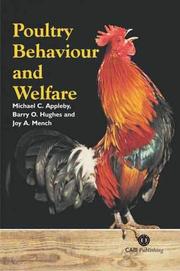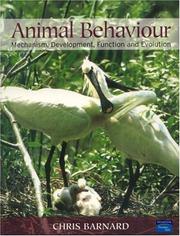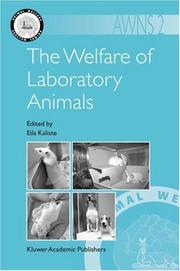| Listing 1 - 9 of 9 |
Sort by
|

ISBN: 085199668X Year: 2004 Publisher: Wallingford : CABI Publishing,
Abstract | Keywords | Export | Availability | Bookmark
 Loading...
Loading...Choose an application
- Reference Manager
- EndNote
- RefWorks (Direct export to RefWorks)
Animal welfare --- Animal husbandry --- Behavior, animal --- Animal diseases --- Agriculture --- ethics

ISBN: 0851996671 9780851996677 Year: 2004 Publisher: Wallingford : CABI publishing,
Abstract | Keywords | Export | Availability | Bookmark
 Loading...
Loading...Choose an application
- Reference Manager
- EndNote
- RefWorks (Direct export to RefWorks)
Poultry --- Behavior --- 634.5 --- dierenwelzijn (lt) --- ethologie --- kip (lt) --- Pluimvee (lt) --- Fowls --- Animal culture --- Aviculture --- Livestock --- Eggs --- Production --- Animal Welfare. --- Behavior, Animal --- Poultry - Behavior --- Animal Welfare --- Behavior, Animal.

ISBN: 9780130899361 0130899364 Year: 2004 Publisher: Harlow, England New York : Pearson Education,
Abstract | Keywords | Export | Availability | Bookmark
 Loading...
Loading...Choose an application
- Reference Manager
- EndNote
- RefWorks (Direct export to RefWorks)
Animal ethology and ecology. Sociobiology --- Dieren : sociaal gedrag --- Dieren : voortplanting --- Dieren : evolutie --- 591 --- Animal behavior. --- Animal ecology. --- Evolution. --- Animal behavior --- Animals --- Animals, Habits and behavior of --- Behavior, Animal --- Ethology --- Animal psychology --- Zoology --- Ethologists --- Psychology, Comparative --- Behavior

ISBN: 9780702026348 9780702037139 0702037133 0702026344 Year: 2004 Publisher: Edinburgh : Saunders,
Abstract | Keywords | Export | Availability | Bookmark
 Loading...
Loading...Choose an application
- Reference Manager
- EndNote
- RefWorks (Direct export to RefWorks)
"With more than 1000 references, the book explores equine behavior from first principles, by considering the behavior of free-ranging horses and focusing on ways in which management and training influence the responses of their domestic counterparts." "Illustrated with more than 500 photographs and line diagrams, Equine Behavior: A guide for veterinarians and equine scientists is an essential resource for practising veterinarians students and enthusiasts with a specific interest in horses, ponies, and donkeys. Professional trainers and handlers, equine scientists and behavior therapists will also find its contents invaluable."--Jacket.
Horses --- 594 --- ethologie (lt) --- gedragsonderzoek(lt) --- Paarden (lt) --- Behavior --- Behavior, Animal. --- Horses. --- Equidae --- Perissodactyla --- Behavior and Behavior Mechanisms --- Mammals --- Psychiatry and Psychology --- Vertebrates --- Chordata --- Animals --- Eukaryota --- Organisms --- Behavior, Animal --- Social Sciences --- Recreation & Sports --- Animalia --- Animal --- Metazoa --- Chordates --- Chordate --- Vertebrate --- Mammalia --- Mammal --- Behavior And Behavior Mechanism --- Perissodactylas --- Ass --- Equus asinus --- Asses --- Donkeys --- Mules --- Zebras --- Donkey --- Mule --- Zebra --- Acceptance Process --- Acceptance Processes --- Behaviors --- Process, Acceptance --- Processes, Acceptance --- Equus caballus --- Equus przewalskii --- Horse, Domestic --- Domestic Horse --- Domestic Horses --- Horse --- Horses, Domestic --- Autotomy Animal --- Animal Behavior --- Animal Behaviors --- Ethology --- Eucarya --- Eukarya --- Eukaryotes --- Eukaryotas --- Eukaryote --- Behavior.

ISBN: 9789812832696 9812832696 9781299604841 1299604846 9789812385918 9812385916 Year: 2004 Publisher: River Edge, NJ : World Scientific,
Abstract | Keywords | Export | Availability | Bookmark
 Loading...
Loading...Choose an application
- Reference Manager
- EndNote
- RefWorks (Direct export to RefWorks)
Those who survive major earthquakes often report the occurrence of mysterious phenomena beforehand - unusual animal and plant behavior, lightning, strange clouds and malfunctioning electrical appliances. In fact these stories are legendary the world over. But are they merely legends? Are the many people who report them just superstitious or suffering from over-active imaginations?Earthquakes and Animals brings objective science to bear on these old legends. But this is not the suspect science associated with recent attempts to validate UFO sightings. The book places in front of the reader the
Earthquake prediction. --- Animal populations --- Extrasensory perception in animals. --- Animal behavior. --- Animals --- Animals, Habits and behavior of --- Behavior, Animal --- Ethology --- Animal psychology --- Zoology --- Ethologists --- Psychology, Comparative --- Animal ESP --- Anpsi --- Parapsychology and animals --- Bioclimatology --- Climatic changes --- Earthquakes --- Prediction, Earthquake --- Geophysical prediction --- Climatic factors. --- Behavior --- Psychic aspects --- Effect of climate on --- Effect of climatic changes on --- Forecasting --- Prediction

ISBN: 0632064684 9780632064687 0470752491 9786610742929 0470790121 1280742925 1405173025 Year: 2004 Publisher: Oxford : Blackwell,
Abstract | Keywords | Export | Availability | Bookmark
 Loading...
Loading...Choose an application
- Reference Manager
- EndNote
- RefWorks (Direct export to RefWorks)
Veterinary pathology --- Psychiatry --- Veterinary physiology --- Physiology of nerves and sense organs --- Animal psychology and neurophysiology --- Zoology --- Pathology --- Veterinary pharmacology --- Affective and dynamic functions --- Animal ethology and ecology. Sociobiology --- Human physiology --- Animal behavior --- Pain in animals --- Pain --- Perception in animals --- 591.044 --- 636.083.1 --- 591.044 Effect of physical and chemical factors of the environment on cells and organisms. Osmosis. Tropisms in general. Heliotropism. Phototropism. Effect of poisons. Atmospheric pressure --- Effect of physical and chemical factors of the environment on cells and organisms. Osmosis. Tropisms in general. Heliotropism. Phototropism. Effect of poisons. Atmospheric pressure --- 636.083.1 Management and maintenance of buildings for rearing livestock. Litter. Comfort and welfare of enclosed animals --- Management and maintenance of buildings for rearing livestock. Litter. Comfort and welfare of enclosed animals --- Domestic animals --- Livestock --- Physiology --- Animal perception --- Animal psychology --- Animal pain --- Animals --- Animals, Habits and behavior of --- Behavior, Animal --- Ethology --- Ethologists --- Psychology, Comparative --- Physiological aspects --- Diseases --- Behavior --- ANIMAL WELFARE --- PAIN --- WOUNDS AND INJURIES --- VETERINARY --- PHYSIOLOGY

ISBN: 9781402022708 1402022700 9781402022715 9781402061363 1402061366 9786610852390 1280852399 1402022719 Year: 2004 Volume: 2 Publisher: Dordrecht, Boston, London : Kluwer Academic Publishers,
Abstract | Keywords | Export | Availability | Bookmark
 Loading...
Loading...Choose an application
- Reference Manager
- EndNote
- RefWorks (Direct export to RefWorks)
Animal welfare is attracting increasing interest worldwide, but particularly from those in developed countries, who now have the knowledge and resources to be able to offer the b est management systems for their farm animals, as well as potentially being able to offer plentiful resources for companion, zoo and laboratory animals. The increased attention given to animal welfare in the West derives la rgely from the fact that the relentless pursuit of financial reward and efficiency has lead to the development of intensive animal production systems that offend the conscience of many consumers in those countries. In devel oping countries, human survival is still a daily uncertainty, so that provision fo r animal welfare has to be balanced against human welfare. Welfare is usua lly provided for only if it supports the output of the animal, be it food, work, clothing, sport or companionship. In reality there are resources for all if they are properly husbanded in both developing and developed countries. The inequitable division of the world’s riches creates physical and psychological poverty for humans and animals alike in all sectors of the world. Liv estock are the world’s biggest land user (FAO, 2002) and the population, particularly of monogastric animals, is increasing rapidly to meet the need of an expanding human population. Populations of animals managed by humans are therefore increasing worldwide, so there is the tendency to allocate fewer resources to each one.
Animal Welfare. --- Animals, Laboratory. --- Animal welfare. --- Laboratory animals. --- Animaux --- Animaux de laboratoire --- Protection --- Agriculture. --- Laboratory animals --- Animal welfare --- Animal Welfare --- Animals, Laboratory --- Animal Population Groups --- Social Control, Formal --- Sociology --- Animals --- Social Sciences --- Eukaryota --- Anthropology, Education, Sociology and Social Phenomena --- Organisms --- Zoology - General --- Social Welfare & Social Work - General --- Animal Sciences --- Zoology --- Agriculture --- Social Welfare & Social Work --- Health & Biological Sciences --- Earth & Environmental Sciences --- Animals, Experimental --- Animals in research --- Experimental animals --- Lab animals --- Animal culture --- Laboratory organisms --- Working animals --- Animal experimentation --- Abuse of animals --- Animal cruelty --- Animals, Cruelty to --- Animals, Protection of --- Animals, Treatment of --- Cruelty to animals --- Humane treatment of animals --- Kindness to animals --- Mistreatment of animals --- Neglect of animals --- Prevention of cruelty to animals --- Protection of animals --- Treatment of animals --- Welfare, Animal --- Abuse of --- Social aspects --- Zoology. --- Animal genetics. --- Animal behavior. --- Animal physiology. --- Veterinary medicine. --- Animal Genetics and Genomics. --- Behavioral Sciences. --- Animal Physiology. --- Veterinary Medicine/Veterinary Science. --- Farriery --- Large animal medicine --- Large animal veterinary medicine --- Livestock medicine --- Veterinary science --- Medicine --- Animal health --- Domestic animals --- Livestock --- Animal physiology --- Biology --- Anatomy --- Animals, Habits and behavior of --- Behavior, Animal --- Ethology --- Animal psychology --- Ethologists --- Psychology, Comparative --- Genetics --- Natural history --- Diseases --- Losses --- Physiology --- Behavior --- Behavioral sciences. --- Animal Husbandry. --- Dogs. --- Rabbits. --- Animal Husbandry --- Dogs --- Rabbits --- Primates --- Rodents --- Swine
Book
ISBN: 0262281899 1417574704 9780262281898 9781417574704 Year: 2004 Publisher: Cambridge, Mass. : MIT Press,
Abstract | Keywords | Export | Availability | Bookmark
 Loading...
Loading...Choose an application
- Reference Manager
- EndNote
- RefWorks (Direct export to RefWorks)
The authors of Complex Worlds from Simpler Nervous Systems explain how animals with small, often minuscule, nervous systems--jumping spiders, bees, praying mantids, toads, and others--are not the simple "reflex machines" they were once thought to be. Because these animals live in the same world as do much larger species, they must meet the same environmental challenges. They do so by constructing complex perceptual worlds within which they can weigh options, make decisions, integrate unique experiences, apply complex algorithms, and execute plans--and they must do this with thousands rather than the billions of neurons necessary for their larger counterparts. The authors of each chapter, leading neuroscientists and animal behaviorists, present their research in ways that allow the reader to understand this process from the animal's perspective. The first of the book's three parts, "Creating Visual Worlds: Using Abstract Representations and Algorithms," examines the visual worlds of jumping spiders, honeybees, praying mantids, and toads. Part II, "Enhancing the Visual Basics: Using Color and Polarization," explores color vision and light polarization perception in honeybees, butterflies, crayfish, mantis shrimps, and octopuses. The final part, "Out of Sight: Creating Extravisual Worlds," examines the complex integration of visual and mechanosensory information in the cockroach and the unique auditory world of the unusual bladder grasshopper. All of these fascinating stories can be read both for what they teach us about the perceptual worlds of little animals, and for what they suggest about the general organizing principles of all central nervous systems, both "simple" and complex.
Cognition in animals. --- Learning in animals. --- Animal behavior. --- Visual Perception --- Behavior, Animal. --- Vision, Ocular --- Sensation --- Light Signal Transduction --- Ocular Physiological Processes --- Behavior --- Perception --- Psychophysiology --- Ocular Physiological Phenomena --- Signal Transduction --- Behavior and Behavior Mechanisms --- Nervous System Physiological Processes --- Mental Processes --- Phenomena and Processes --- Biochemical Processes --- Nervous System Physiological Phenomena --- Cell Physiological Processes --- Psychiatry and Psychology --- Psychological Phenomena and Processes --- Chemical Processes --- Cell Physiological Phenomena --- Biochemical Phenomena --- Musculoskeletal and Neural Physiological Phenomena --- Chemical Phenomena --- Behavior, Animal --- Zoology --- Health & Biological Sciences --- Animal Behavior --- physiology. --- Animal Behaviors --- Behaviors, Animal --- Light Signal Transduction, Visual --- Ocular Vision --- Visual Light Signal Transduction --- Visual Phototransduction --- Visual Transduction --- Vision --- Phototransduction, Visual --- Transduction, Visual --- Perception, Visual --- Perceptions, Visual --- Visual Perceptions --- Chemical Phenomenon --- Chemical Process --- Physical Chemistry Phenomena --- Physical Chemistry Process --- Physicochemical Phenomenon --- Physicochemical Process --- Chemical Concepts --- Physical Chemistry Concepts --- Physical Chemistry Processes --- Physicochemical Concepts --- Physicochemical Phenomena --- Physicochemical Processes --- Chemical Concept --- Chemistry Process, Physical --- Chemistry Processes, Physical --- Concept, Chemical --- Concept, Physical Chemistry --- Concept, Physicochemical --- Concepts, Chemical --- Concepts, Physical Chemistry --- Concepts, Physicochemical --- Phenomena, Chemical --- Phenomena, Physical Chemistry --- Phenomena, Physicochemical --- Phenomenon, Chemical --- Phenomenon, Physicochemical --- Physical Chemistry Concept --- Physicochemical Concept --- Process, Chemical --- Process, Physical Chemistry --- Process, Physicochemical --- Processes, Chemical --- Processes, Physical Chemistry --- Processes, Physicochemical --- Musculoskeletal and Neural Physiological Concepts --- Musculoskeletal and Neural Physiological Phenomenon --- Musculoskeletal and Neural Physiology --- Biochemical Concepts --- Biochemical Phenomenon --- Biochemical Process --- Phenomena, Biochemical --- Biochemical Concept --- Concept, Biochemical --- Concepts, Biochemical --- Phenomenon, Biochemical --- Process, Biochemical --- Processes, Biochemical --- Cell Physiological Phenomenon --- Cell Physiological Process --- Physiology, Cell --- Cell Physiology --- Phenomena, Cell Physiological --- Phenomenon, Cell Physiological --- Physiological Process, Cell --- Physiological Processes, Cell --- Process, Cell Physiological --- Processes, Cell Physiological --- Cells --- Psychologic Processes and Principles --- Human Information Processing --- Information Processing, Human --- Nervous System Physiological Concepts --- Nervous System Physiological Phenomenon --- Nervous System Physiological Process --- Physiology, Nervous System --- Nervous System Physiologic Processes --- Nervous System Physiology --- System Physiology, Nervous --- Nervous System --- Receptor Mediated Signal Transduction --- Signal Transduction Pathways --- Signal Transduction Systems --- Receptor-Mediated Signal Transduction --- Signal Pathways --- Pathway, Signal --- Pathway, Signal Transduction --- Pathways, Signal --- Pathways, Signal Transduction --- Receptor-Mediated Signal Transductions --- Signal Pathway --- Signal Transduction Pathway --- Signal Transduction System --- Signal Transduction, Receptor-Mediated --- Signal Transductions --- Signal Transductions, Receptor-Mediated --- System, Signal Transduction --- Systems, Signal Transduction --- Transduction, Signal --- Transductions, Signal --- Eye Physiology --- Ocular Physiologic Process --- Ocular Physiological Concepts --- Ocular Physiological Phenomenon --- Ocular Physiological Process --- Physiology of the Eye --- Physiology, Ocular --- Visual Physiology --- Ocular Physiologic Processes --- Ocular Physiology --- Concept, Ocular Physiological --- Concepts, Ocular Physiological --- Ocular Physiological Concept --- Phenomena, Ocular Physiological --- Phenomenon, Ocular Physiological --- Physiologic Process, Ocular --- Physiologic Processes, Ocular --- Physiological Concept, Ocular --- Physiological Concepts, Ocular --- Physiological Process, Ocular --- Physiological Processes, Ocular --- Physiology, Eye --- Physiology, Visual --- Process, Ocular Physiologic --- Process, Ocular Physiological --- Processes, Ocular Physiologic --- Processes, Ocular Physiological --- Eye --- Mind-Body Relationship (Physiology) --- Physiologic Psychology --- Physiological Psychology --- Psychology, Physiologic --- Mind-Body Relations (Physiology) --- Psychology, Physiological --- Mind Body Relations (Physiology) --- Mind Body Relationship (Physiology) --- Mind-Body Relation (Physiology) --- Mind-Body Relationships (Physiology) --- Physiologic Psychologies --- Psychologies, Physiologic --- Relation, Mind-Body (Physiology) --- Relations, Mind-Body (Physiology) --- Relationship, Mind-Body (Physiology) --- Relationships, Mind-Body (Physiology) --- Perceptions --- Acceptance Process --- Acceptance Processes --- Behaviors --- Process, Acceptance --- Processes, Acceptance --- Phototransduction --- Signal Transduction, Light --- Transduction, Light Signal --- Organoleptic --- Sensory Function --- Function, Sensory --- Functions, Sensory --- Sensations --- Sensory Functions --- Animals --- Animals, Habits and behavior of --- Ethology --- Animal learning --- Animal cognition --- physiology --- Ophthalmology --- Molecular Biology --- Psychologic Processes --- Psychological Processes --- Phenomena, Psychological --- Processes, Psychologic --- Processes, Psychological --- Psychological Phenomenas --- Psychological Processe --- Cell Communication --- Receptor-CD3 Complex, Antigen, T-Cell --- Receptor Cross-Talk --- Feedback, Physiological --- Gasotransmitters --- Psychosomatic Medicine --- Mind-Body Relations, Metaphysical --- Photoreceptors, Plant --- Animal psychology --- Ethologists --- Psychology, Comparative --- Animal intelligence --- Cell Signaling --- NEUROSCIENCE/General --- COGNITIVE SCIENCES/General
Book
ISBN: 0262281015 1417574410 0262293153 9780262281010 9781417574414 9780262293150 Year: 2004 Publisher: Cambridge, Mass. : MIT Press,
Abstract | Keywords | Export | Availability | Bookmark
 Loading...
Loading...Choose an application
- Reference Manager
- EndNote
- RefWorks (Direct export to RefWorks)
Laying foundations for an interdisciplinary approach to the study of evolution in communication systems with tools from evolutionary biology, linguistics, animal behavior, developmental psychology, philosophy, cognitive sciences, robotics, and neural network modeling.The search for origins of communication in a wide variety of species including humans is rapidly becoming a thoroughly interdisciplinary enterprise. In this volume, scientists engaged in the fields of evolutionary biology, linguistics, animal behavior, developmental psychology, philosophy, the cognitive sciences, robotics, and neural network modeling come together to explore a comparative approach to the evolution of communication systems. The comparisons range from parrot talk to squid skin displays, from human language to Aibo the robot dog's language learning, and from monkey babbling to the newborn human infant cry. The authors explore the mysterious circumstances surrounding the emergence of human language, which they propose to be intricately connected with drastic changes in human lifestyle. While it is not yet clear what the physical environmental circumstances were that fostered social changes in the hominid line, the volume offers converging evidence and theory from several lines of research suggesting that language depended upon the restructuring of ancient human social groups. The volume also offers new theoretical treatments of both primitive communication systems and human language, providing new perspectives on how to recognize both their similarities and their differences. Explorations of new technologies in robotics, neural network modeling and pattern recognition offer many opportunities to simulate and evaluate theoretical proposals. The North American and European scientists who have contributed to this volume represent a vanguard of thinking about how humanity came to have the capacity for language and how nonhumans provide a background of remarkable capabilities that help clarify the foundations of speech.
Communication --- Animal communication. --- Human evolution. --- Language and languages --- Animal Communication. --- Biological Evolution. --- Cognition. --- Language Development. --- Physiology, Comparative. --- Animal communication --- Human evolution --- Physiology, Comparative --- Biological Evolution --- Language Development --- Animal Communication --- Cognition --- Genetic Processes --- Physiology --- Information Science --- Child Development --- Behavior --- Biological Processes --- Mental Processes --- Behavior, Animal --- Biological Phenomena --- Biological Science Disciplines --- Human Development --- Psychological Phenomena and Processes --- Genetic Phenomena --- Behavior and Behavior Mechanisms --- Psychiatry and Psychology --- Phenomena and Processes --- Natural Science Disciplines --- Disciplines and Occupations --- Communication & Mass Media --- Journalism & Communications --- History. --- Origin. --- History --- Origin --- Natural Sciences --- Physical Sciences --- Discipline, Natural Science --- Disciplines, Natural Science --- Natural Science --- Natural Science Discipline --- Physical Science --- Science, Natural --- Science, Physical --- Sciences, Natural --- Sciences, Physical --- Genetic Concepts --- Genetic Phenomenon --- Genetic Process --- Concept, Genetic --- Concepts, Genetic --- Genetic Concept --- Phenomena, Genetic --- Phenomenon, Genetic --- Process, Genetic --- Processes, Genetic --- Psychologic Processes and Principles --- Acceptance Process --- Acceptance Processes --- Behaviors --- Process, Acceptance --- Processes, Acceptance --- Infant Development --- Development, Child --- Development, Infant --- Information Sciences --- Science, Information --- Sciences, Information --- Cognitive Function --- Cognitions --- Cognitive Functions --- Function, Cognitive --- Functions, Cognitive --- Animal Communications --- Communication, Animal --- Communications, Animal --- Development, Language --- Developments, Language --- Language Developments --- Communication Programs --- Communications Personnel --- Misinformation --- Personal Communication --- Communication Program --- Communication, Personal --- Personnel, Communications --- Program, Communication --- Programs, Communication --- Evolution, Biological --- Comparative Physiology --- Foreign languages --- Languages --- Animal biocommunication --- Animal language --- Biocommunication, Animal --- Language learning by animals --- Development, Human --- Biologic Sciences --- Biological Science --- Science, Biological --- Sciences, Biological --- Biological Sciences --- Life Sciences --- Biologic Science --- Biological Science Discipline --- Discipline, Biological Science --- Disciplines, Biological Science --- Life Science --- Science Discipline, Biological --- Science Disciplines, Biological --- Science, Biologic --- Science, Life --- Sciences, Biologic --- Sciences, Life --- Biologic Phenomena --- Biological Phenomenon --- Biological Process --- Phenomena, Biological --- Phenomena, Biologic --- Phenomenon, Biological --- Process, Biological --- Processes, Biological --- Animal Behavior --- Animal Behaviors --- Behaviors, Animal --- Human Information Processing --- Information Processing, Human --- Origin of languages --- Speech --- Molecular Biology --- Psychologic Processes --- Psychological Processes --- Phenomena, Psychological --- Processes, Psychologic --- Processes, Psychological --- Psychological Phenomenas --- Psychological Processe --- Psychology, Child --- Growth --- Psycholinguistics --- Sociobiology --- Anthropology --- Ethnology --- Information theory --- Meaning (Psychology) --- Philology --- Linguistics --- Evolution (Biology) --- Physical anthropology --- Evolutionary psychology --- Human beings --- Animal behavior --- Psychology, Developmental --- Ethology --- Humans --- BIOMEDICAL SCIENCES/General --- BIOMEDICAL SCIENCES/Evolution
| Listing 1 - 9 of 9 |
Sort by
|

 Search
Search Feedback
Feedback About
About Help
Help News
News